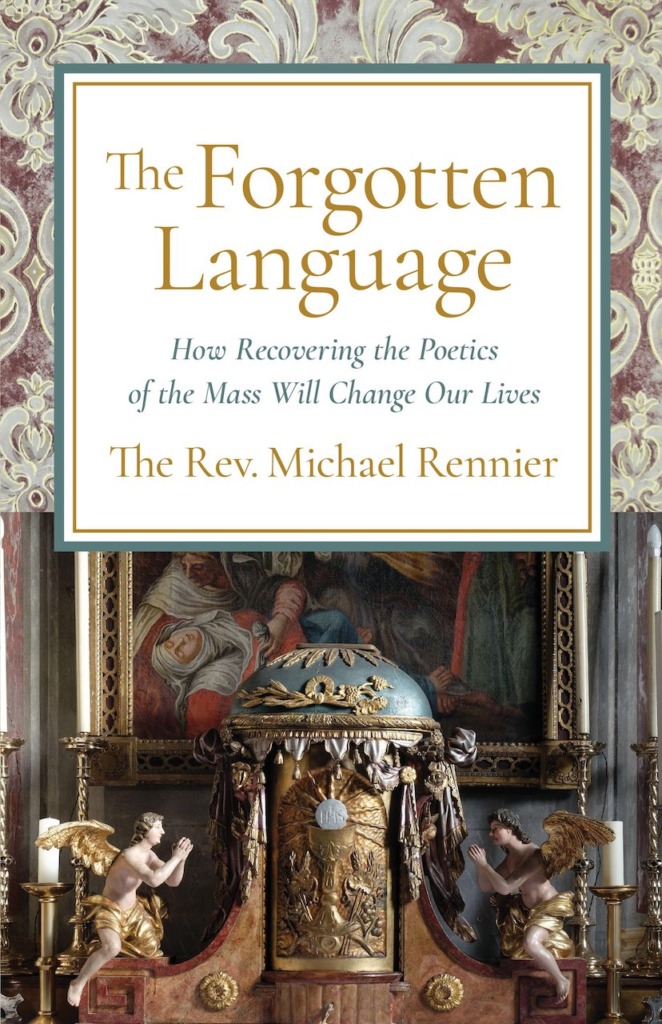“The Forgotten Language: How Recovering the Poetics of the Mass Will Change Our Lives”
By Father Michael Rennier
Sophia Institute Press (2022)
197 pp., $17.95
Father Michael Rennier’s new book, “The Forgotten Language: How Recovering the Poetics of the Mass Will Change Our Lives,” opens with two thought-provoking questions: “What does it mean to be made? What does it mean to be a maker?” The answers to both, he asserts, is “poetics.”
“Poetics is the art of living,” he writes. “For a Christian, it’s also the art of learning to live as a saint, an exploration of what it means to claim that God is remaking us through grace.” With that response, Father Rennier takes the reader on a reflective journey, focusing on the beauty, depth and transcendence of the Mass, where Jesus “accomplishes his most beautiful, most creative work.” Rennier states that we, as creatures made in the image and likeness of the Creator, are charged with the poetic, and “we might even say, priestly task … to connect earth to Heaven.”
This book is not a discourse on the Mass, or a dissertation on liturgical rubrics, or a scriptural exegesis on sacramental origins. Rather, it’s a literary Venn diagram combining poetry, love and beauty, and residing in the space where the circles overlap is the holy sacrifice of the Mass. This book is less a linear journey from point A to point B – though Rennier does describe his conversion into Catholicism – but rather a dance. The reader is not on a path, but in a ballroom, being whisked over and across the entire floor. Not wildly or sporadically, but with tempo and meter, with pacing and grace. It took me several chapters to grasp this, and when I allowed Rennier to lead, a poetic congruence was revealed, and I fell into the rhythm. There really isn’t any other way to describe it.
“The Forgotten Language” is song – or, better still – poetry in prose form. Ideas and reflections glide from one into another with what seems to be disorder, because in the Mass Rennier is describing something that transcends our ability to fully comprehend the reality of what is occurring. He calls the Mass the great love poem of God, that it is God’s language for us and to us. Rennier reminds the reader that the Mass is poetry, and like most poetry, it isn’t easily understood. He writes:
“Why doesn’t poetry say exactly what it means? Why do we have to sit with it, examine it, discuss it?
“The poem does say exactly what the poet wants to say. That’s the point. It’s simply that we’re unprepared. The meaning is shrouded because the Mass expresses a living faith that dwells beyond words. Through symbolic language it creates a unity of concrete and abstract, physical and metaphysical, truth and beauty. It expresses the fullness of reality.”
The book is revolutionary, not only for how it cycles and circles through its themes, but because it presents the Mass in a new, profound way. It asks the reader to view it through the lens of a poet, as a person loved by the supreme Lover. “The Forgotten Language” isn’t a polemic extolling the supremacy of the Tridentine (Latin) Mass over the Novus Ordo (though I suspect Rennier, while still loving the new form, prefers the older rite). Rather, it is an invitation to recognize the beauty and love being offered within the Mass, so that by the graces received, we can (once dismissed) incorporate its poetics into every aspect of our lives. In the final chapter, he writes:
“You are the particular, a person unlike any other, and your life is meant to be a unique embodiment of the divine. This is your work.”
It is work for all of us. Challenging, beautiful work.

